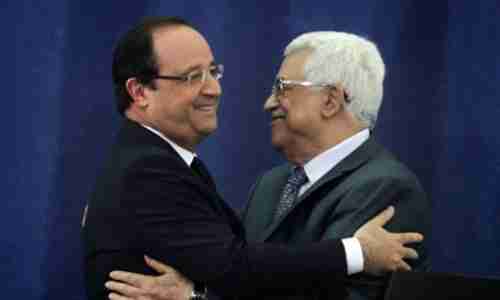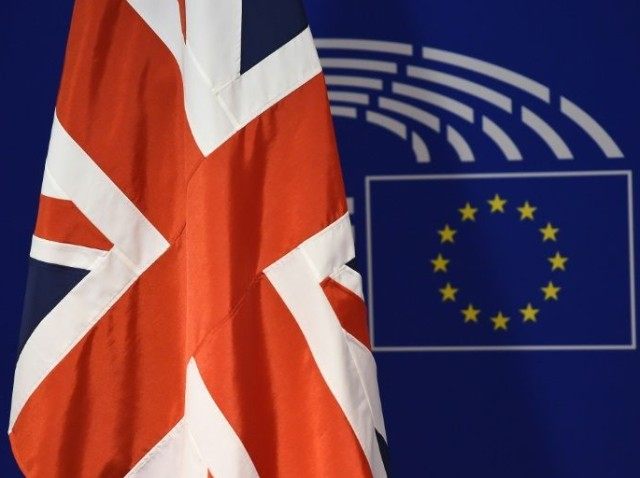This morning’s key headlines from GenerationalDynamics.com
- France to launch new Israeli-Palestinian peace process on May 30
- Britain debates which migrants can vote in the ‘Brexit’ referendum
France to launch new Israeli-Palestinian peace process on May 30

French president François Hollande and Palestinian Authority president Mahmoud Abbas
France will launch a new Israeli-Palestinian peace process on May 30, but without involving the Israelis or the Palestinians.
France will invite ministers from 20 countries to the May 30 conference. The goal of the May 30 meeting was to prepare an international summit in the second half of 2016. In that case, Israel and the Palestinians would finally be invited.
According to France’s foreign minister Jean-Marc Ayrault, the goal of the May 30 meeting is clear:
To build a collective commitment of the international community in preparation for paving a diplomatic horizon for peace. It is in everyone’s interest. The guiding principle is also clear and recognized: The two-state solution. I want to return to the guiding principles of this solution, because there is a tendency not to mention them. We are talking about the State of Israel and the state of Palestine living side by side in peace and security, with secure and recognized borders on the basis of the 1967 borders, with Jerusalem their shared capital.
Here we go again. This is essentially the “Mideast Roadmap to Peace” that was offered by President Bush in 2003. As I wrote in May 2003 in “Mideast Roadmap – Will it bring peace?”, the plan would not succeed because Generational Dynamics predicts that Arabs and Jews would be refighting the 1948 war that followed the partitioning of Palestine and the creation of the state of Israel.
Since 2003, there have been five Mideast wars: the war between Israelis and Hezbollah, fought largely on Lebanon’s soil in 2006; the war between Palestinian factions Hamas and Fatah in Gaza in 2008, that led to Hamas control of Gaza; Operation Cast Lead, the war between Israel and Hamas in Gaza early in 2009; the two wars between Israel and Hamas in Gaza in November, 2012 and July-August 2014.
Beyond that, the Arab Awakening has destabilized countries all around the Mideast, given rise to the so-called Islamic State (IS or ISIS or ISIL or Daesh), and inflamed the sectarian fault lines between Sunnis and Shias from India to Algeria.
But Ayrault is unfazed by all that:
I did not say it would be easy. The parties are now far apart, maybe more than ever. We have on one side, in Israel, a government that shows more and more ambivalence to the two-state plan… and on the other side the Palestinians, who are not only divided [on this question], but also must address growing anger from their public. And we also have the situation itself — there is no need to mention there have already been two conflicts in six years. Is there an alternative to the plan we are proposing? The only other option is a fatalistic acceptance of conflict. I reject that approach.
So I guess Ayrault will be Pollyannaish, and leave being fatalistic to people like me. Haaretz (Israel) and Al Ahram (Cairo) and Israel National News
Britain debates which migrants can vote in the ‘Brexit’ referendum
Europeans who have been following the American primary elections have expressed astonishment and puzzlement over the complexity of America’s election laws. However, they might wish to take a look at the UK elections laws for the June 23 referendum that will decide “Brexit,” whether Britain will exit from the European Union.
Nominally, British and Irish citizens will be permitted to vote “yes” or “no” in the referendum. But this simple formula is complicated by two issues.
The first issue is migrants from other countries who are living in Britain. The rule is that even if the migrant is not British or Irish citizen, he can still vote in the referendum, provided that he’s from one of the Commonwealth countries. When the British Empire broke up after World War II, it was replaced by the British Commonwealth of Nations, consisting mostly of former British colonies. The Queen is still nominally the head of state for the Commonwealth countries.
I listed the 53 countries in the Commonwealth and some of the controversies surrounding the Commonwealth in a 2007 article, “Pakistan is suspended from the British Commonwealth of Nations”.
So this rule has quite a few anomalies. A migrant from France or Italy working in Britain would not be eligible to vote in the referendum. But a migrant from Australia, Bangladesh, Jamaica, Kenya, the Bahamas, Uganda or Zambia would be eligible to vote in the referendum. The only two European countries that are in the Commonwealth are Malta and Cyprus, and so migrants from those countries would be eligible to vote.
Obviously, this situation is raising complaints. According to Lord Green, the founder of the campaign group Migration Watch UK:
Of course we are not opposed to Commonwealth citizens who are also British citizens having a vote. But if they are not yet British or have decided not to become British it is surely wrong that they should be able to.
The total number of Commonwealth migrants potentially eligible to vote in the referendum is 1.3 million, a number large enough to possibly affect the referendum results.
I said that there were two issues, and the second issue has to do with migration in the other direction. According to the “15 year rule,” a citizen of Britain who is living and working in another country is eligible to vote in the referendum only if he’s lived in Britain at some time in the last 15 years.
The referendum highlights a particular problem for expats living in another EU country. British citizens living in the EU are also EU citizens, and can live and work in other countries, retire there, and receive health care free at the point of use, paid for by Britain’s National Health Service (NHS).
Estimates are that there are 1-2 million expats in this category who moved into another EU country more than 15 years ago. They’re unable to vote in the referendum, even though a Brexit “yes” vote could leave them in limbo, because they’d lose their EU citizenship. CNBC and Telegraph (London) and Express (London)
KEYS: Generational Dynamics, France, Israel, Palestinian Authority, Jean-Marc Ayrault, Britain, Brexit, British Commonwealth, Lord Green
Permanent web link to this article
Receive daily World View columns by e-mail

COMMENTS
Please let us know if you're having issues with commenting.